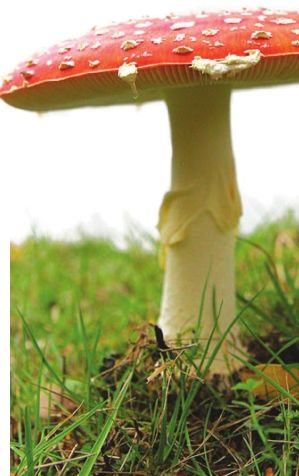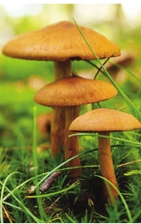
Beware: Mushrooms can be deadly
FAMILY LOVE
Alot of moisture and the right amount of organic material in the soil and those pesky mushrooms begin spiraling up in various places in our yards.
But don’t be fooled by them, they can be deadly. After a lot of rain and cooler temperatures, mushrooms may begin to show themselves in our yards, and they may have the potential to kill.
When I see mushrooms popping up in my neighborhood or around town, my mind races back to an unforgettable afternoon I remember as if it was yesterday.
That particular afternoon, my 4-year-old daughter was introduced to a
mushroom growing on the borderline of our yard and our next door
neighbor’s.
Two
neighborhood boys, who were in the fourth or fifth grade, were walking
by our yard. They knew my daughter, and my daughter knew them. They made
a split-second decision to tell my then-4-yearold daughter that the
mushroom growing in our yard was candy and suggested she take a bite.
They pretended to take a bite themselves before handing it to her.
 I’m
sure they really did not know that the mushroom could have been
potentially harmful and poisonous. They were out having fun, playing
harmless tricks, or so they thought, on younger children in various
ways.
I’m
sure they really did not know that the mushroom could have been
potentially harmful and poisonous. They were out having fun, playing
harmless tricks, or so they thought, on younger children in various
ways.
My daughter knew
them and didn’t have any reason not to trust them. So she took a bite
of the mushroom. It happened before I could stop her from putting it in
her mouth.
She took
one bite and spit it out because it didn’t taste too good. With child
and mushroom in tow, I ran inside and called our pediatrician.
The doctor told us that it most likely wasn’t poisonous and prescribed a
medicine that would make her throw up any residue. After my husband
raced to the store, got the medication and brought it to the house, we
gave the medication to her thinking it would take care of any harm that
might come from that one bite if it just might be poisonous.
She
didn’t just throw up but also became lethargic and almost lifeless. She
was perspiring profusely, and the perspiration had gone through a
sheet, a blanket and her bedspread.
Another
frantic call to the doctor, we were told to hurry to the emergency room
because the symptoms were showing it was most likely poisonous. When we
arrived, the nurse said she could not hear a heartbeat. My knees
crumbled.
The doctor
looked at us and said, “I have never treated a case with a poisonous
mushroom. I have called all my colleagues, and they have not either, so I
am doing what my medical book says to do.” Her clothes were cut off,
and an antidote was administered.
My
daughter was very quiet and very still through the night but was still
breathing. We were allowed to stay by her bed in the intensive care unit
all night, and we did not take our eyes off her. After a grueling
night, we witnessed our daughter opening her eyes and immediately using
her hands to cover her body because she was embarrassed about not having
her pajamas on.
 We knew then she was back, breathing and reacting. She even asked for some ice cream.
We knew then she was back, breathing and reacting. She even asked for some ice cream.
Upon
her release from the hospital, we were told to watch for any longterm
effects, but none ever showed up. We were so, so very grateful to God
for granting her life and for Dr. William Haynie and his God-given
skills to make her whole again.
Children
are inquisitive and want to touch, taste and manipulate items they find
in their environment. That is how they learn, so they touch and taste
everything in which they come in contact with no ability to give thought
of it being harmful. At a very young age, they don’t have the maturity
to think through whether something might be harmful or not.
So be on alert for any potential mushrooms growing where your child or any other child could touch or taste them.
Share this inormation and you might save a life!
So
parents be warned: Do not let your child touch or taste any mushroom
that grows in your yard or anyone else’s yard. If you have several
popping up, remove them and inquire about how to relieve your yard of
them. They can be harmful to humans and to dogs, too. Understand that
mushrooms found in your yard should not be burned nor put into a compost
pile. Wear disposable gloves when removing them and put them in a
plastic bag before disposing of them.
Dianne Glasgow is a family and child specialist at the LSU AgCenter in Caddo Parish.
She can be reached at [email protected], 226-6805 or 464-2552.